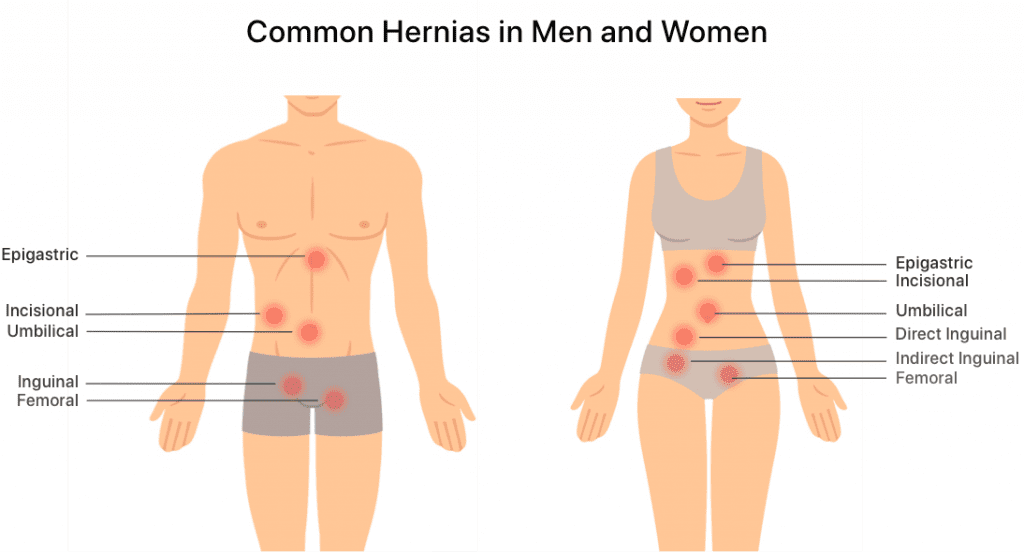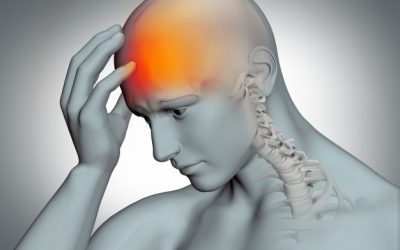EVERYTHING YOU WANT TO KNOW ABOUT HERNIA

A hernia occurs when an organ pushes through an opening in the muscle or tissue that holds it in place. Many hernias occur in the abdomen between your chest and hips, but they can also appear in the upper high and groin areas.
Most hernias aren’t immediately life-threatening, but they don’t go away on their own. Sometimes they can require surgery to prevent dangerous complications.
SYMPTOMS OF A HERNIA:
The most common symptom of a hernia is a bulge or lump in the affected area. For Example, in the case of an inguinal hernia, you may notice a lump on either side of your pubic bone where your groin and thigh meet.
Some types of hernia, such as Hiatal Hernias, can have more specific symptoms. These can include things like heartburn, trouble swallowing, and chest pain. In many cases, hernias have no symptoms. You may not know you have a hernia unless it shows up during a routine physical or a medical exam for an unrelated problem.
HERNIA RECOVERY:
It’s important to recognize the signs of hernia and to see your doctor if you suspect that you have one. An untreated hernia won’t go away by itself. You doctor can assess your hernia and determine how it can best be treated.
Hernias can cause complications that are life-threatening. It’s important that you seek emergency care if you experience symptoms such as nausea or vomiting, fever, or sudden pain. Early medical care and lifestyle changes can minimize symptoms. However, surgery is the only way to effectively treat a hernia. There are different types of surgeries available to repair hernias, and your surgeon can advise on which one is right for your condition.
The prognosis for hernia repair surgery is generally very good, but can depend on the nature of the hernia, your symptoms, and your overall health. In some cases, the hernia may recur following repair.
HERNIA CAUSES:
Hernias are caused by a combination of muscle weakness and strain. Depending on its cause a hernia can develop quickly or over a long period of time.

Some common causes of muscle weakness or strain that can lead to a hernia include:
- A congenital condition that occurs during development in the womb and is present from birth.
- Aging
- Damage from an injury or Surgery
- Chronic coughing or chronic obstructive pulmonary disorder (COPD)
- Strenuous exercise or lifting heavy weights
- Pregnancy, especially having multiple pregnancies
- Constipation, which causes you to strain when having a bowel movement
- Being overweight or obese.
- Fluid in the abdomen, or ascites.
There are also certain things that can increase your risk of developing a hernia. They include:
- A personal or family history of hernias
- Being older
- Pregnancy
- Being overweight or obese
- Chronic constipation
- Chronic cough (likely due to the repetitive increase in abdominal pressure)
- Cystic fibrosis
- Smoking (Leading to weakening of connective tissue)
- Being born prematurely or with a low birth weight
HERNIA DIAGNOSIS:
To diagnose your condition, your doctor will first perform a physical examination. During this examination, doctor may feel for a bulge in your abdominal or groin are that gets larger when you stand, cough, or strain. Doctor will then take your medical history. They may ask you a variety of questions, including things like:
- When did you first notice the bulge?
- Tell me a little bit about your lifestyle. Does your occupation involve heavy lifting? Do you exercise rigorously? Do you have a history of smoking?
- Do you have a personal or family history of hernias?
- Have you had any surgeries in the area of your abdomen or groin?
Doctor will also likely use imaging tests to aid in their diagnosis. These can include things like:
- Abdominal Ultrasound, which uses high-frequency sound waves to creat an image of the structures inside the body.
- CT scan, which combines X-rays with computer technology to produce an image
- MRI scan, which uses a combination of strong magnets and radio waves to make an image.
If a hiatal hernia is suspected, your doctor may use other tests that allow them to assess the internal location of your stomach:
HERNIA SURGERY:
In your hernia is growing larges or causing pain, your surgeon may decide it’s best to operate. They may repair your hernia by sewing the hole in the abdominal wall closed during surgery. This is commonly done by patching the hole with surgical mesh.
Hernias can be repaired with either open or laparoscopic surgery. Laparoscopic surgery uses a tiny camera and miniaturized surgical equipment to repair the hernia using only a few small incisions. It’s also less damaging to the surrounding tissue.
Not all hernias are suitable for laparoscopic surgery. If your hernia requires an open surgical repair, your surgeon will work with you to determine which type of surgery is best for your condition.
HERNIA TYPES:
There are several different types of hernias. Below, we’ll explore some of the most common ones.
- INGUINAL HERNIA:Inguinal hernias are the most common type of hernia. These occur when the intestines push through a weak spot or tear in the lower abdominal wall, often in the inguinal canal. This type is also more common in men.
- UMBILICAL HERNIA:Umbilical hernias can occur in children and babies. This happens when their intestine bulge through their abdominal wall near their belly button. You may notice a bulge in or near your child’s belly button, especially when they’re crying.An umbilical hernia is the only kind that often goes away on its own as the abdominal wall muscles get stronger, typically by the time the child is 1 or 2 years old. If the hernia hasn’t gone away by 5 years of age, surgery can be used to correct it.
- VENTRAL HERNIA:A ventral hernia happens when tissue bulges through an opening in the muscles of your abdomen. You may notice that the size of a ventral hernia reduce when you’re lying down.Although a ventral hernia can be present from birth, it’s more commonly acquired at some point during your lifetime. Common factors in ventral hernia formation include things like obesity, strenuous activity, and pregnancy.
HERNIA TREATMENT:
The only way to effectively treat a hernia is through surgical repair. However, whether or not you need surgery depends on the size of your hernia and the severity of your symptoms. Doctor may want to simply monitor your hernia for possible complications. This is called watchful waiting.
HERNIA PREVENTION:
You can’t always prevent a hernia from developing. Sometimes an existing inherited condition or previous surgery allows a hernia to occur.
However, you can make some simple lifestyle adjustments to help you avoid getting a hernia. These steps air to reduce the amount of strain you place on your body.
Here are a few general hernia prevention tips:

- Stop Smoking
- See your doctor when you are sick to avoid developing a persistent cough.
- Maintain a healthy body weight
- Try not to strain while having a bowel movement or during urination.
- Eat enough high-fiber foods to prevent constipation
- Perform exercises that help to strengthen the muscles of your abdomen
- Avoid lifting weights that are too heavy for you. If you must lift something heavy, bend at your knees and not your waist or back.
DR.VIJAYRAJSINH GOHIL
(G I & LAPAROSCOPIC SURGEON)
(BARIATRIC & METABOLIC SURGEON)
Departments
- Department Of Cardiology
- Neurology
- Nephrology
- Urology
- Spine Surgery
- Orthopaedics/ Trauma
- General Medicine
- General and Laparoscopic Surgery
- Gastrointestinal Surgery
- Bariatric And Diabetes Surgery
- Intensive Care/ Critical Care
- Pulmonology
- Obstetrics and Gynecology
- Oral and maxillofacial surgery
- Dental and Implant surgery
- Neuro Surgery
- Radiology
- Physiotherapy






